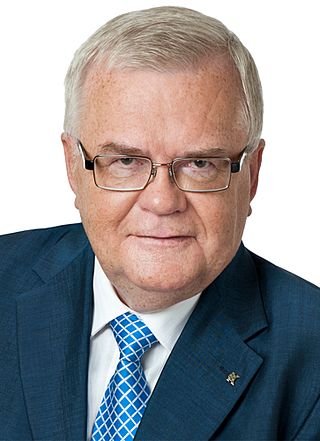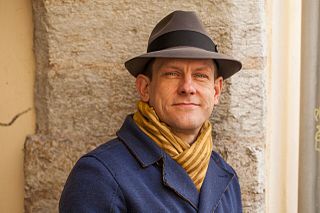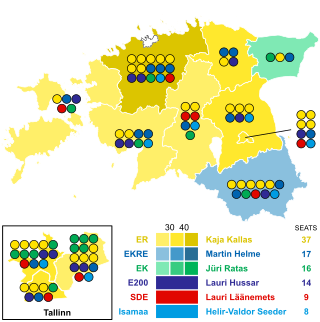
The Estonian Centre Party is a populist political party in Estonia. It was founded in 1991 as a direct successor of the Popular Front of Estonia, and it is currently led by Mihhail Kõlvart.

Edgar Savisaar was an Estonian politician, one of the founding members of Popular Front of Estonia and the Centre Party. He served as the acting Prime Minister of Estonia, Minister of the Interior, Minister of Economic Affairs and Communications, and twice mayor of Tallinn.
Eesti Televisioon (ETV) is an Estonian free-to-air television channel owned and operated by Estonian Public Broadcasting. It made its first broadcast on 19 July 1955.
Estonia participated in the Eurovision Song Contest 2011 with the song "Rockefeller Street" written by Sven Lõhmus. The song was performed by Getter Jaani. The Estonian broadcaster Eesti Rahvusringhääling (ERR) organised the national final Eesti Laul 2011 in order to select the Estonian entry for the 2011 contest in Düsseldorf, Germany. The national final consisted of three shows: two semi-finals and a final. Ten songs competed in each semi-final and the top five from each semi-final as determined by a jury panel and public vote qualified to the final. In the final, the winner was selected over two rounds of voting. In the first round, a jury panel and a public vote selected the top two to qualify to the superfinal. In the superfinal, "Rockefeller Street" performed by Getter Jaani was selected as the winner entirely by a public vote.
Estonia participated in the Eurovision Song Contest 2012 with the song "Kuula" written by Ott Lepland and Aapo Ilves. The song was performed by Ott Lepland. The Estonian broadcaster Eesti Rahvusringhääling (ERR) organised the national final Eesti Laul 2012 in order to select the Estonian entry for the 2012 contest in Baku, Azerbaijan. The national final consisted of three shows: two semi-finals and a final. Ten songs competed in each semi-final and the top five from each semi-final as determined by a jury panel and public vote qualified to the final. In the final, the winner was selected over two rounds of voting. In the first round, a jury panel and a public vote selected the top two to qualify to the superfinal. In the superfinal, "Kuula" performed by Ott Lepland was selected as the winner entirely by a public vote.

The Conservative People's Party of Estonia is a nationalist and right-wing populist political party in Estonia led by Martin Helme. It was founded in March 2012 with the merger of People's Union of Estonia and Estonian Patriotic Movement. Its first leader, Margo Miljand, served as the chairman until 2013 when he was succeeded by Mart Helme. Its popularity remained low until late 2014, when the party began to draw supporters from the right; in the 2015 Estonian parliamentary election, it passed the electoral threshold and won seats in parliament for the first time. Since then, its support has grown, turning it into one of the largest parties in Estonia. In the 2019 Estonian parliamentary election, EKRE placed third, winning 19 seats in total. Mart was succeeded as party chairman by his son, Martin Helme, in July 2020.

Mart Helme is an Estonian politician, diplomat and historian who served as the Minister of the Interior from 2019 to 2020. He was the longtime chairman of the national conservative Conservative People's Party of Estonia (EKRE) from 13 April 2013 to 4 July 2020 when he was succeeded by his son Martin Helme.
Estonia participated in the Eurovision Song Contest 2014 with the song "Amazing" written by Timo Vendt and Tanja. The song was performed by Tanja. The Estonian broadcaster Eesti Rahvusringhääling (ERR) organised the national final Eesti Laul 2014 in order to select the Estonian entry for the 2014 contest in Copenhagen, Denmark. The national final consisted of three shows: two semi-finals and a final. Ten songs competed in each semi-final and the top five from each semi-final as determined by a jury panel and public vote qualified to the final. In the final, the winner was selected over two rounds of voting. In the first round, a jury panel and a public vote selected the top two to qualify to the superfinal. In the superfinal, "Amazing" performed by Tanja was selected as the winner entirely by a public vote.
Estonia participated in the Eurovision Song Contest 2015 with the song "Goodbye to Yesterday" written by Stig Rästa. The song was performed by Elina Born and Stig Rästa. The Estonian broadcaster Eesti Rahvusringhääling (ERR) organised the national final Eesti Laul 2015 in order to select the Estonian entry for the 2015 contest in Vienna, Austria. The national final consisted of three shows: two semi-finals and a final. Ten songs competed in each semi-final and the top five from each semi-final as determined by a jury panel and public vote qualified to the final. In the final, the winner was selected over two rounds of voting. In the first round, a jury panel and a public vote selected the top three to qualify to the superfinal. In the superfinal, "Goodbye to Yesterday" performed by Elina Born and Stig Rästa was selected as the winner entirely by a public vote.

Jaak Madison is an Estonian politician and a member the European Parliament, where he is a member of the Committee on Foreign Affairs and the Committee on International Trade. He was member and deputy chairman of the Conservative People's Party of Estonia until leaving the party in June 2024 and joining Estonian Centre Party.
Estonia participated in the Eurovision Song Contest 2016 with the song "Play" written by Fred Krieger, Stig Rästa and Vallo Kikas. The song was performed by Jüri Pootsmann. The Estonian broadcaster Eesti Rahvusringhääling (ERR) organised the national final Eesti Laul 2016 in order to select the Estonian entry for the 2016 contest in Stockholm, Sweden. The national final consisted of three shows: two semi-finals and a final. Ten songs competed in each semi-final and the top five from each semi-final as determined by a jury panel and public vote qualified to the final. In the final, the winner was selected over two rounds of voting. In the first round, a jury panel and a public vote selected the top three to qualify to the superfinal. In the superfinal, "Play" performed by Jüri Pootsmann was selected as the winner entirely by a public vote.

Jan Uuspõld is an Estonian stage, television, radio and film actor and musician.

Kersti Kaljulaid is an Estonian politician who served as the fifth president of Estonia between 2016 and 2021, and was its first and only female head of state since the country declared independence in 1918. She was also the youngest president, aged 46 at the time of her election.

Parliamentary elections were held in Estonia on 5 March 2023 to elect all 101 members of the Riigikogu. The officially published election data indicate the victory of the Reform Party, which won 37 seats in total, while the Conservative People's Party of Estonia (EKRE) placed second with 17 seats. The Centre Party won 16 seats, a loss of 10, while Estonia 200 won 14 seats, gaining representation in the Riigikogu.

Jüri Ratas's second cabinet was the 50th cabinet of Estonia, in office from 29 April 2019 to 14 January 2021. It was a centre-right coalition cabinet of the Centre Party, right-wing populist Conservative People's Party (EKRE) and conservative Isamaa.
Maila Rästas was an Estonian stage, film, and radio actress. Rästas was employed at Estonian Drama Theatre in Tallinn from 1961 until 1992 before retiring. She also appeared in several films.
Liina Vahtrik is an Estonian actress.
Piret Krumm is an Estonian actress, singer, and comedian whose career began in the early 2010s. She has performed as a stage, television, film and voice actress, as well as a jury panelist for the Eesti Laul competition. She is a singer for the Tallinn-based band Diskofon.

Henrik Kalmet is an Estonian actor, comedian, and television personality. Kalmet began his career in 2010 and has appeared as an actor on stage, television, and films. He is also a stand-up comedian and has appeared as a judge and presenter on several Estonian television series. In 2011, he was a cofounder of the theatre troupe Kinoteater.

Marek Reinaas is an Estonian columnist, advertising executive, entrepreneur, and politician. In April 2023, he was elected to XV Riigikogu, representing the Estonia 200 party.











